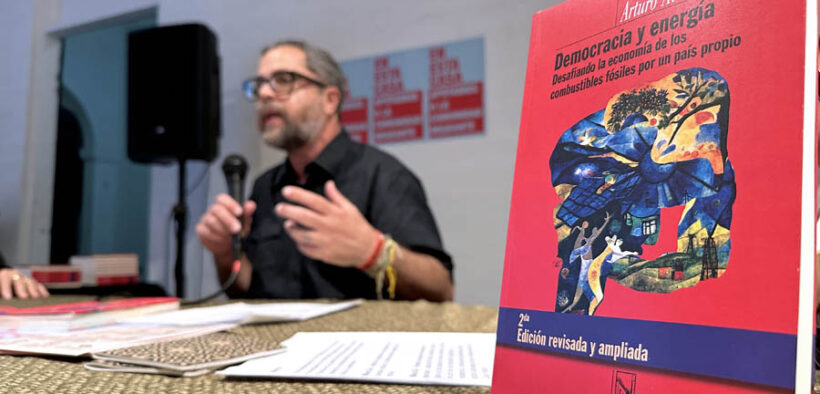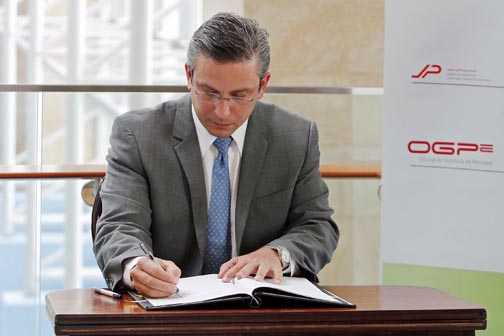Common front sought to fight energy threats to Puerto Rico

In a new book, Arturo Massol-Deyá urges community action to counter the government’s energy policies.
An urgent call for mobilization to confront a government agenda “that seeks to tie the island down” to the perpetual use of fossil fuels was made during the presentation of the second edition of the book entitled “Democracia y energía. Desafiando la economía de los combustibles fósiles por un país propio” (“Democracy and Energy: Challenging the Fossil Fuel Economy for a Country of Our Own”), by Arturo Massol-Deyá.
The consensus of the people participating in the discussion was that Puerto Rico should reject the establishment of new generating plants that operate with methane gas, the extension of coal-burning beyond 2027, the connection to receive electricity from the Dominican Republic and the multimillion-dollar expenditure on a battery storage system for Genera PR plants.
They said this is because all these proposals “unjustifiably postpone the goal of conversion to renewable energy, and none of them favor the social and economic development of those who live in the archipelago.”
“Right now, all that is lined up is a new gas plant and a gas pipeline circuit, as if that would solve any problem on this island. Now they also tell us that they are going to build a cable, and we’re going to put the plants not in Salinas, but in the Dominican Republic, far away, because they want to gasify us through the back door,” said Massol-Deyá, associate director of Casa Pueblo, from the Taller Comunidad La Goyco in Santurce.
“They talk about putting $800 million into batteries for all of Genera PR’s thermoelectric plants. And people say, ‘How great that there will be batteries, and it will mitigate the blackouts.’ But are those batteries meant to integrate renewable energy, to move us into the future? The answer is no. It is to cover up the ineptitude, the inefficiency, the inability of Genera Puerto Rico to operate and maintain the plants they told us they were going to fix. And since they fail so frequently, they also need a backup — and they need the island to build it for them. It is a totally bizarre configuration,” said the university professor.
“With the proposal on the table, what is intended is to reformulate the collapsed colonial model that is reflected in the collapsed energy system,” which requires community mobilization to counteract this “government offensive,” he added.
“At some point, there must be another kind of conversation, of integration, with a simple and specific agenda, such as saying no to the gas pipeline. Everyone had differences, but it was no to the gas pipeline, and that was it,” said the author.
Massol-Deyá acknowledged that there are differences of opinion among the groups that favor the use of renewable energy but stressed that this cause is so meritorious that unity is essential.
“With energy, we will have to reach a very clear point where we are all in agreement, and we will have to take to the streets or do something. Because we (at Casa Pueblo) will continue to build our example — we have documented that it works — but the threat is very large, and the implications of what is being built are very overwhelming,” he said.
“What is coming to the island is serious and very damaging. The energy model that is going to be reconstructed is to make it impossible to live on this island and to make you leave,” said Massol-Deyá, suggesting that the solution is to build energy independence. In his most recent publication, he summarizes the work that Casa Pueblo has done in that direction.
“In a colonized island like this one, energy transformation must lead us to our first independence, which must be energy independence. Among those who aspire to statehood, those who want to turn their backs on the colonial reality or those who aspire to the Republic of Puerto Rico, I believe there is a horizontal consensus that we have to have the capacity to produce our own energy — to enhance our productive activities and to live better in our daily lives, to be better prepared for the challenges of LUMA, Genera, earthquakes, climate change and everything that this implies for our island,” he said.
To achieve energy independence, he proposed the “energy insurrection” led by Casa Pueblo from Adjuntas, which consists of promoting generation projects at the point of consumption and establishing microgrids — without relying on government assistance or financing.
“It’s an energy insurrection so that we have the capacity to produce energy to be able to self-determine, as we have proven in Casa Pueblo, as we do in the Plaza de la Independencia Energética, as we have been building little by little,” he said.
“Freedoms are built, and they don’t go from 0 to 100 out of nowhere. Progress is being made, and we have been advancing and establishing a benchmark that this energy independence is possible, that it is necessary, that it is within reach and that we must fight to achieve it,” Massol-Deyá said.
During the discussion, concerns were also raised by the public about the need to develop self-financing models to facilitate the mass adoption of solar systems, as well as rejection of industrial solar farms and the “usurious practices” of certain solar energy companies.
“We promote community energy. We promote the democratization of energy, and that the right to energy is not just for those who can pay for or finance solar energy, but for the poor of this island,” he said.
The book was presented by Annette Martínez-Orabona, executive director of the American Civil Liberties Union (ACLU) in Puerto Rico,.
Massol-Deyá described it as “a personal book, a necessary story that we need to recognize” and reflect on, and that it is also a memoir.
“It’s a book that is necessary at a time when our memory is being stripped away, when books on critical analysis are being canceled, when our own schools do not want to talk about our history. I think it is a great contribution to our people,” he said.
He added that the book, published by Ediciones Callejón, serves as a work plan and establishes a roadmap.
“It’s a tough book because it gives hope, but when you leave the book and return to the reality we are living today, it feels so heavy, it feels so impossible. So I think this book is like a rescue, like a life preserver — like a way to bring us back to believing that it is possible, that you can dream, not just of something ideal, but that you can act on that dream and turn it into reality, something that is so necessary at a time like this,” said Martínez-Orabona.
* Editor’s Note: News is my Business earns a small commission if you click the link in this post and make a purchase, at no additional cost to you.









